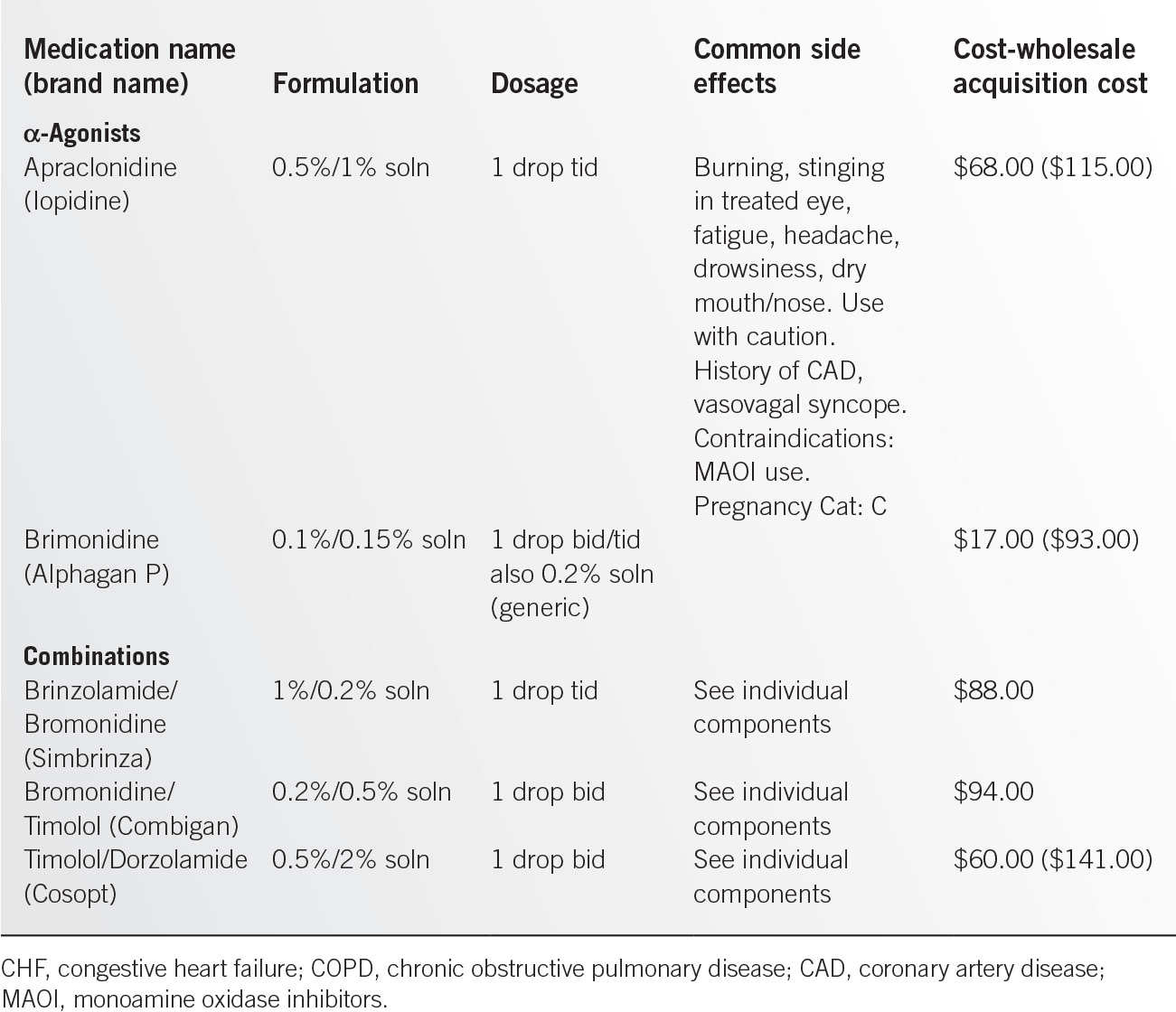
• Surgery: Surgery is generally used when medical treatment fails to appropriately lower IOP; however, surgery may be utilized as initial therapy for POAG, especially if patients are unable to use or prefer not to use eye drops. Laser trabeculoplasty is the surgery of choice (AAO A:1 evidence), lowering IOP by increasing aqueous outflow. Laser surgery is highly successful, lowering the IOP sufficiently about 75% of the time. Surgery may be repeated or medication added if the drop in IOP is insufficient.28 Other surgical interventions are incisional in nature and include trabeculectomy or aqueous shunts, both of which should be reserved for those who fail medication or laser trabeculoplasty. Other treatments including acupuncture/acupressure and herbal medication lack direct evidence of success.
REFERENCES
1. Centers for Disease Control and Prevention (CDC). Prevalence of visual impairment and selected eye diseases among persons aged >=50 years with and without diabetes—United States, 2002. MMWR 2004;53(45):1069–1071.
2. Tan AG, Wang JJ, Rochtchina E, et al. Comparison of age-specific cataract prevalence in two population-based surveys 6 years apart. BMC Ophthalmol 2006;6:19.
3. Kanthan GL, Wang JJ, Rochtchina E, et al. Use of antihypertensive medications and topical beta-blockers and the long-term incidence of cataract and cataract surgery. Br J Ophthalmol 2009;93:1210.
4. Garbe E, Suissa S, LeLorier J. Exposure to allopurinol and the risk of cataract extraction in elderly patients. Arch Ophthalmol 1998;116(12):1652–1656.
5. Kelly SP, Thornton J, Edwards E, et al. Smoking and cataract: review of causal association. J Cataract Refract Surg 2005;31(12):2395–2404.
6. Mathew MC, Ervin AM, Davis RM. Antioxidant vitamin supplementation for preventing and slowing the progression of age-related cataract. Cochrane Database Syst Rev 2012;6:CD004567.
7. Katz J, Feldman MA, Bass EB, et al. Risks and benefits of anticoagulant and antiplatelet medication used before cataract surgery. Ophthalmology 2003;110(12):2309.
8. Bell CM, Hatch WV, Fischer HD, et al. Association between tamsulosin and serious ophthalmic adverse events in older med following cataract surgery. JAMA 2009;301(19):1991–1996.
9. Clark DS. Posterior capsule opacification. Curr Opin Ophthalmol 2000;11(1):55–64.
10. Wang JJ, Med M, Klein R, et al. Cataract surgery and the 5-year incidence of late stage age-related maculopathy: pooled findings from the Beaver Dam and Blue Mountains eye studies. Ophthalmology 2003;110:1960–1967.
11. Bailey RN, Indian RW, Zhang X. Visual impairment and eye care among older adults—five States, 2005. MMWR 2006;55(49):1321.
12. Lee PP, Feldman ZW, Ostermann J, et al. Longitudinal prevalence of major eye diseases. Arch Ophthalmol 2003;121(9):1303–1310.
13. Chakravarthy U1, Evans J, Rosenfeld PJ. Age related macular degeneration. BMJ 2010;340:c981.
14. van Leeuwen R, Klaver CC, Vingerling JR, et al. The risk and natural course of age-related maculopathy: follow-up at 6 1/2 years in the Rotterdam study. Arch Ophthalmol 2003;121(4):519–526.
15. Seddon JM, George S, Rosner B. Cigarette smoking, fish consumption, omega-3 fatty acid intake, and associations with age-related macular degeneration: the US Twin Study of Age-Related Macular Degeneration. Arch Ophthalmol 2006;124(7):995–1001.
16. Chong EW, Kreis AJ, Wong TY, et al. Alcohol consumption and the risk of age-related macular degeneration: a systematic review and meta-analysis. Am J Ophthalmol 2008;145(4):707–715.
17. Sui GY, Liu GC, Liu GY, et al. Is sunlight exposure a risk factor for age-related macular degeneration? A systematic review and meta-analysis. Br J Ophthalmol 2013;97(4):389–394.
18. Klein R, Klein BE, Wong TY, et al. The association of cataract and cataract surgery with the long-term incidence of age-related maculopathy: the Beaver Dam eye study. Arch Ophthalmol 2002;120(11):1551–1558.
19. Seddon JM, Francis PJ, George S, et al. Association of CFH Y402H and LOC387715 A69S with progression of age-related macular degeneration. JAMA 2007;297(16):1793–1800.
20. Bressler SB, Muñoz B, Solomon SD, et al; Salisbury Eye Evaluation (SEE) Study Team. Racial differences in the prevalence of age-related macular degeneration: the Salisbury Eye Evaluation (SEE) Project. Arch Ophthalmol 2008;126(2):241–245.
21. Age-Related Eye Diseases Study Group. A simplified severity scale for age-related macular degeneration. AREDS report 18. Arch Ophthalmol 2005;123:1570–1574.
22. Age-Related Eye Disease Study Research Group. A randomized, placebo-controlled, clinical trial of high-dose supplementation with vitamins C and E, beta carotene, and zinc for age-related macular degeneration and vision loss. AREDS report no. 8. Arch Ophthalmol 2001;119(10)1417–1436.
23. Schmucker C, Loke YK, Ehlken C, et al. Intravitreal bevacizumab (Avastin) versus ranibizumab (Lucentis) for the treatment of age-related macular degeneration: a safety review. Am J Ophthalmol 2011;95(3):308–317.
24. American Academy of Ophthalmology Glaucoma Panel. Primary open-angle glaucoma suspect. San Francisco, CA: American Academy of Ophthalmology; 2010.
25. Quigley HA. Glaucoma. Lancet 2011;377(9774):1367–1377.
26. Holland H, Johnson D, Hollands S, et al. Do findings on routine examination identify patients at risk for primary open-angle glaucoma? JAMA 2013;309(19):2035–2042.
27. Leske MC. Open-angle glaucoma—an epidemiologic overview. Ophthalmic Epidemiol 2007;14:166–172.
28. Open-Angle Glaucoma. DynaMed September 11, 2013. http://web.b.ebscohost.com.medjournal.hmc.psu.edu:2048/dynamed
29. Screening for Glaucoma. United States Preventive Services Task Force Recommendation Statement, July 9, 2013. http://www.uspreventiveservicestaskforce.org/Page/Topic/recommendation-summary/glaucoma-screening
Stay updated, free articles. Join our Telegram channel

Full access? Get Clinical Tree


